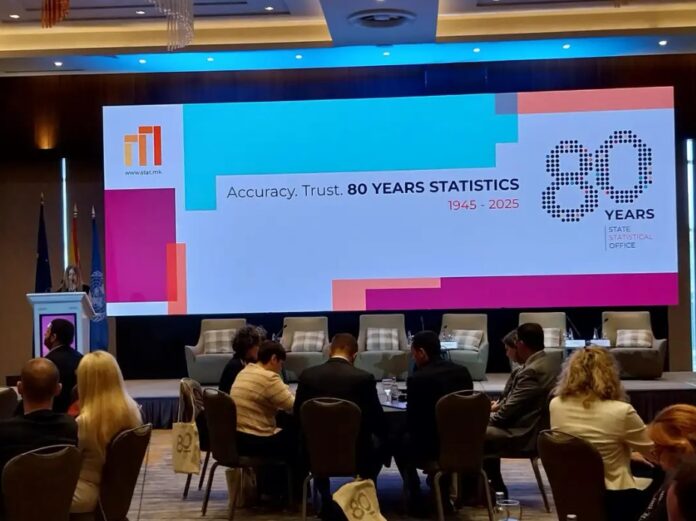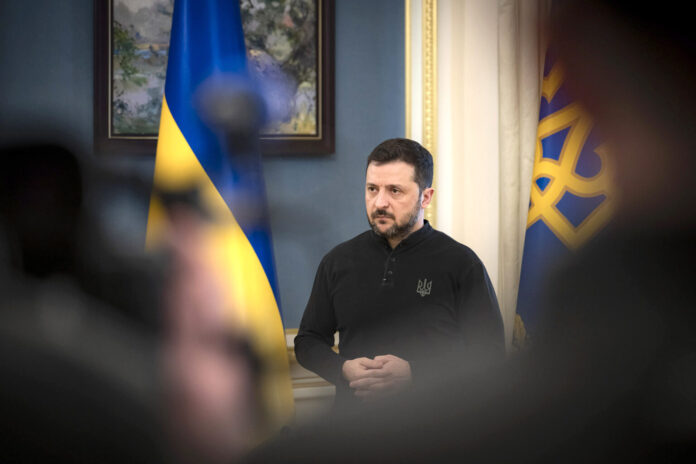Festive Academy on the occasion of 80 years SSO: Statistics are the compass showing us where we are and where we go

In a modern and transparent society, statistics are a mirror of reality. It is the compass that shows us where we are and where we go. Statistics provide civic involvement, public accountability and social dialogue. Without quality and independent data – there is no quality democracy, the speakers said today during the Academy on the occasion of the 80th anniversary of the founding of the State Statistical Office, as well as 25 years since gathering gender -separated data in the country, held in Skopje.
The Director of the State Statistical Office, Dejan Stankov, said in his address that in the past eight decades, official statistics were not only a tool of the state administration. It has become a testimony to our history, economic growth, demographic changes, social trends and every attempt to build a better tomorrow.
-The founders of the founders of the official statistics told us about the unreserved commitment to the creation of the first statistical programs, methodological solutions and data collection that served the state for making wise and responsible decisions. In 1951 a new chapter began. The Statistical Office was established, and in 1961 the first law on statistics was adopted. Legal foundation that provided stability and direction for future development- Stankov said.
He added, with the acquisition of state independence in 1991, the Institute received a prominent role, to be the only and official holder of state statistics, and since 1997 with the Law on State Statistics and Coordinator of the National Statistical System.
-From manually collected data to modern digital platforms. From statistical annuals in paper form to open databases, available to all citizens. The road that official statistics goes is really impressive. Today, when we go back to the eight decades filled with dedicated work, we can proudly say- official statistics are the foundation of public confidence and driver of development policies- said Stankov.
He underlined that with over 300 statistical research, with verified, available, reliable and scientifically based data, the Institute documented the challenges and changes that our country shape.
He pointed out that today the institution is facing a lack of professional staff and insufficient use of digital information collection tools, but noted that they will devote themselves to fully institutional reorganization in the coming period, in order to realize our strategic nature.
Prime Minister Christian Mickoski in his address to the event pointed out that Macedonian statistics are largely in line with European statistical practice and international standards.
« These 80 years are not just history -they are a tradition of professionalism, credibility and public service, which are the foundation of the democratic and institutional development of our country. In a modern and transparent society, statistics are a mirror of reality. It is a tool for analysis, planning basis, and a roadmap to create effective and responsible public policies. Through accurate, reliable and timely data, institutions can make decisions that meet the real needs of the citizens- said Mickoski.
As he pointed out, the data produced by the State Statistical Office are official, high quality and internationally comparable – which distinguishes this institution as a key source of information in the country.
« Through the adoption of the National Strategy for the Development of the Statistical System, through financial stability, investing in IT infrastructure, human resources, as well as through cooperation with European institutions, we create conditions for the State Statistical Office to remain independent, modern and professional- explained Mickoski.
He added that the institution also has a particular importance in the process of negotiations with the European Union, where statistics are crucial to measuring progress and assessing reform processes.
-Your work may not always be the focus of the public, but it is irreplaceable. Thanks to your commitment, methodological accuracy and institutional responsibility, our country has statistics that are respected at home and recognized outside. The challenges that come are new – digitization, artificial intelligence, new sources of data. But I am sure that with the knowledge, capacity and support you have, the State Statistical Office will continue to be a pillar of truth, objectivity and progress- added Mickoski.
Existing United Nations co -ordinator Rita Colombia underlined that statistics staff have a vital role in society.
-Your commitment to becoming leaders of the progress of statistics in accordance with community development is not unnoticed. Today we celebrate each of you and express gratitude for the incredible work you do, which contributes to the development of the country. You play a vital role and provide the Government and all stakeholders necessary planning tools based on evidence. The objective monitoring and evaluation of the data you collect are necessary, to ensure transparency, make transparent decisions, accountability and optimization of resources – said Columbia.
Head of the Department of Cooperation at the European Union Delegation, Stephen Hudolin, in his address pointed out that for Northern Macedonia, credible, timely and quality statistics is essential for the road to the EU.
-Statistics are much more than just a figure. It is the language of making informed decisions, a way that we understand the needs of society, economic potential and the challenges that must be overcome. Alignment with European legislation is an important venture, which is necessary to harmonize standards and practices in different domains, with statistics being critical- added Colombia.








